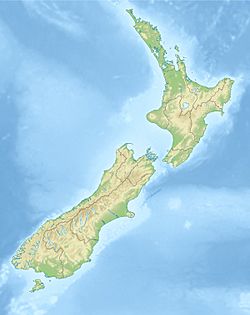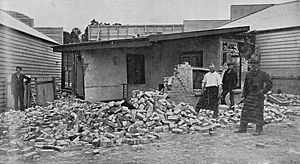1901 Cheviot earthquake facts for kids
| UTC time | 1901-11-15 20:15 |
|---|---|
| ISC event | 16957744 |
| USGS-ANSS | n/a |
| Local date | 16 November 1901 |
| Local time | 07:47 NZT |
| Magnitude | 6.9 |
| Depth | 33 km |
| Areas affected | South Island, New Zealand |
| Casualties | 1 death |
The 1901 Cheviot earthquake was a strong earthquake that shook New Zealand on 16 November 1901. It happened at 7:47 AM local time. The earthquake was quite powerful, with a strength of about 6.9. Its center was close to a town called Cheviot in the Canterbury area of New Zealand's South Island.
Contents
What Happened in the 1901 Cheviot Earthquake?
The 1901 Cheviot earthquake was a significant natural event. It occurred deep underground, about 33 kilometers below the surface. This earthquake was felt across a wide area of the South Island.
How Strong Was It?
Scientists measure earthquakes using a scale called magnitude. The Cheviot earthquake had a magnitude of 6.9. This means it was a strong earthquake, capable of causing a lot of shaking and damage.
When Did the Earthquake Strike?
The earthquake happened on 16 November 1901, at 7:47 AM New Zealand Time (NZT). This time is important for understanding how people were affected.
Damage and Effects of the Earthquake
The earthquake caused damage to buildings and the land. It also led to one sad loss of life.
Impact on People and Buildings
Sadly, one baby died when a simple house made of sod (earth and grass) collapsed. We don't know about other injuries in the Canterbury area.
The famous ChristChurch Cathedral in Christchurch was also damaged. The very top part of its spire fell off again because of the shaking. After this, the stone spire was replaced with a stronger one made of wood and covered in copper. It also had a special weight inside to help it move less during earthquakes.
Land Changes from the Earthquake
In the town of Kaiapoi, people saw some interesting changes to the ground. There were reports of "sand blows," which are like small sand volcanoes. This happens when the ground becomes like liquid during an earthquake. It's called soil liquefaction. This effect was seen in several areas near the Kaiapoi River.
 | Janet Taylor Pickett |
 | Synthia Saint James |
 | Howardena Pindell |
 | Faith Ringgold |



